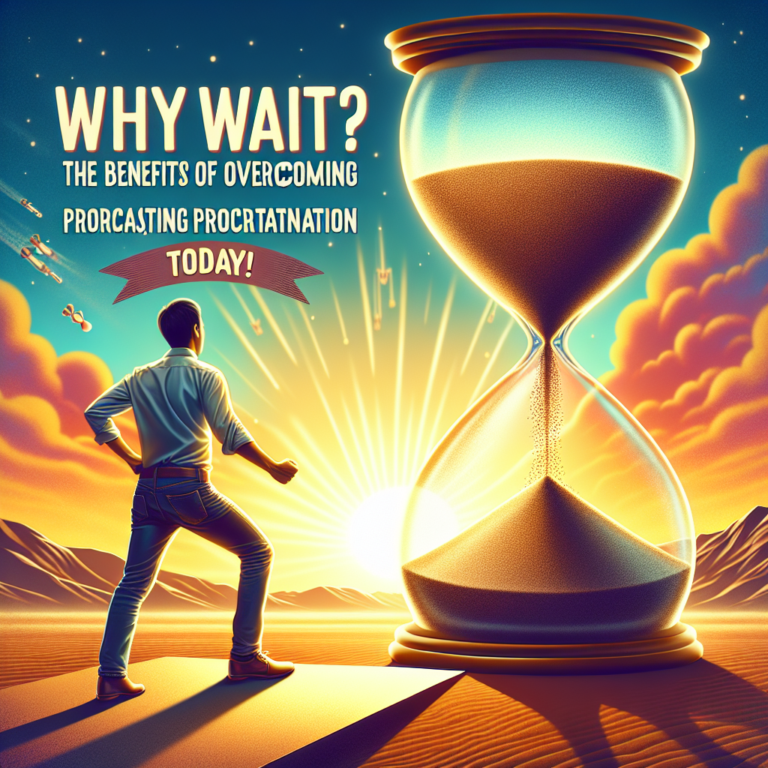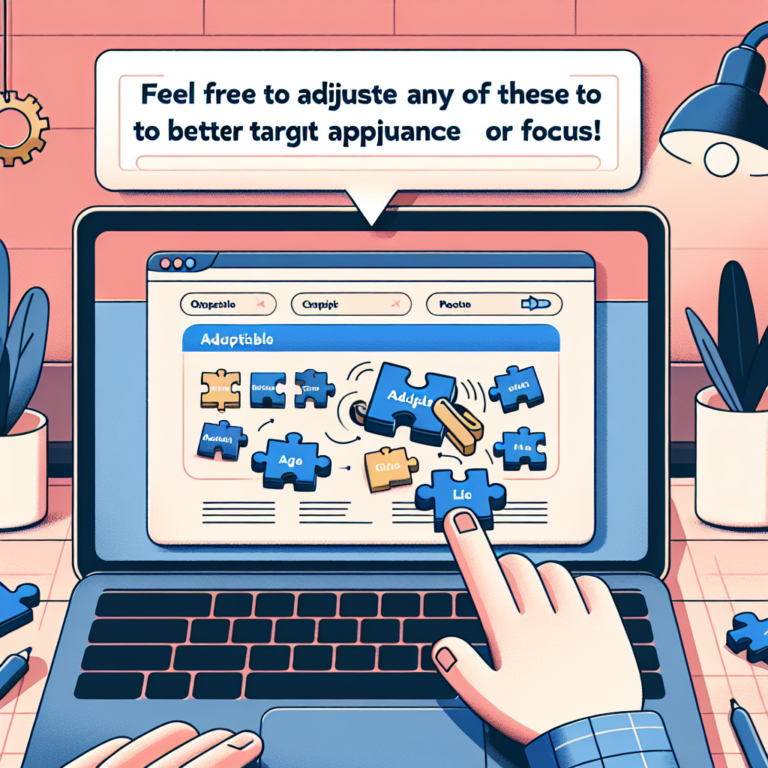
Ditching the ‘Tomorrow’ Mentality: Your Essential Guide to Overcoming Procrastination
Introduction: The Cost of Tomorrow
Have you ever promised yourself that you would start working on that project, begin exercising, or make that important phone call tomorrow—only for tomorrow to turn into a week, a month, or even a year? If so, you’re not alone. Procrastination is a universal ailment that affects nearly everyone at some point in their lives. In today’s fast-paced world, effectively managing our time and tasks is paramount. “Ditching the ‘Tomorrow’ Mentality: Your Guide to Overcoming Procrastination” offers valuable insights to help you break free from the clutches of delay.
This article will walk you through understanding the procrastination cycle, identify its causes, and provide practical strategies to combat this counterproductive behavior. By the end, you will be armed with tools to turn your focus toward action—today, not tomorrow.
Understanding Procrastination: What’s Really Going On?
The Psychology Behind Procrastination
To effectively deal with procrastination, it’s essential to understand why it happens. Researchers have identified various psychological triggers that lead to procrastination:
- Fear of Failure: Many avoid tasks due to a fear of not meeting expectations—whether their own or others’.
- Perfectionism: The desire for perfection can paralyze us into inaction, leading to the belief that if we can’t do something perfectly, it’s not worth doing at all.
- Overwhelm: A task may feel too daunting, leading us to push it off. The more overwhelming it feels, the easier it becomes to postpone.
Understanding these psychological landscapes helps in “Ditching the ‘Tomorrow’ Mentality: Your Guide to Overcoming Procrastination.” By addressing the root causes, you can devise actionable strategies.
Case Study: The Scientist Who Beat Procrastination
Dr. Barbara Oakley, a professor of engineering, struggled with procrastination, particularly in her early education. However, she learned to develop concrete strategies to take action rather than delay. She began breaking tasks into smaller, manageable pieces and scheduled her work in short bursts followed by breaks—a technique she describes in her online course.
Dr. Oakley’s approach serves as an excellent example of how to overcome the paralyzing effect of procrastination through structured scheduling.
The Impact of Procrastination on Life and Work
Personal and Professional Consequences
Procrastination can have far-reaching effects. In personal life, it can hinder relationship-building, health, and overall satisfaction. Professionally, procrastination can lead to missed deadlines, increased stress, and negative evaluations from peers or bosses.
Consider the following statistics:
| Impact of Procrastination | Percentage |
|---|---|
| People who identify as chronic procrastinators | 20% |
| Increased stress and anxiety from procrastination | 75% |
| Professionals who feel less productive due to procrastination | 60% |
These figures illustrate that procrastination is not just a minor inconvenience—it’s a significant barrier that many face today.
Case Study: A Corporate Perspective
At a mid-sized tech company, a pervasive procrastination culture had formed, slowing down project timelines and reducing team morale. Leadership decided to tackle procrastination head-on by implementing "Focus Fridays," where employees committed to completing pending tasks without distractions. The results showed a 30% increase in productivity and an overall improvement in workplace satisfaction.
This serves as a powerful lesson in setting clear expectations and creating an environment conducive to focus—a crucial step in “Ditching the ‘Tomorrow’ Mentality: Your Guide to Overcoming Procrastination.”
Strategies to Overcome Procrastination
1. Set Clear Goals
Setting SMART (Specific, Measurable, Achievable, Relevant, Time-bound) goals can greatly reduce the likelihood of procrastination. Break larger tasks into smaller, actionable steps.
Example:
If your goal is to write a book, a SMART goal would be writing 500 words a day for a month.
2. Use the Two-Minute Rule
If you can complete a task in two minutes or less, do it immediately. This simple rule can drastically reduce your “to-do” list and alleviate feelings of overwhelm.
3. Create a Schedule
Dedicated time slots for specific tasks can create a routine that combats the urge to procrastinate. Consider blocking off time on your calendar for high-priority tasks and treat them as appointments you cannot miss.
4. Accountability Partners
Sharing your goals with a friend or colleague creates social pressure and support that significantly reduces procrastination. Regular check-ins can help maintain focus and momentum.
5. Mindfulness and Self-Compassion
Practice self-acceptance and mindfulness techniques. Meditation can help you become aware of procrastination urges without judgment—allowing you to choose a different course of action.
Case Study: The Beach Body Challenge
A group of friends teamed up to tackle their fitness goals. Each week, they would share their progress and setbacks in a group chat. This form of accountability not only increased their commitment but also made the journey enjoyable.
By supporting each other, they were able to develop a routine that placed their fitness goals front and center.
Tools and Apps to Help You Stay On Track
| Tool/App | Description |
|---|---|
| Trello | Organize tasks visually with boards and to-do lists. |
| Asana | Track project progress and collaborate with teams. |
| Focus@Will | Music designed to improve focus and reduce distractions. |
| Forest | Gamifies staying focused by growing a virtual tree. |
Using these tools can streamline your workflow, minimize distractions, and enhance your productivity as you focus on “Ditching the ‘Tomorrow’ Mentality: Your Guide to Overcoming Procrastination.”
Developing Long-Term Solutions
Cultivating a Growth Mindset
Adopt a mindset that embraces challenges and sees failures as opportunities for growth. A growth mindset is essential in overcoming procrastination, allowing you to reframe negative thoughts and take constructive action.
Practice Gratitude
An attitude of gratitude can shift your focus away from negative feelings associated with procrastination. Regularly acknowledging what you are thankful for can build resilience and foster a more positive outlook.
Conclusion: Take Action Today—Not Tomorrow!
Successfully “Ditching the ‘Tomorrow’ Mentality: Your Guide to Overcoming Procrastination” requires self-awareness, commitment, and a structured approach. Start by recognizing the triggers of your procrastination and deploy strategies to counteract them. Remember, the path to overcoming procrastination is a journey, not a sprint.
Now is the time to take the first step. Whether it’s establishing goals, engaging with accountability partners, or utilizing effective tools, each step you take brings you closer to breaking the cycle of delay. Embrace the present and turn “tomorrow’s tasks” into today’s accomplishments!
FAQs
1. What causes procrastination?
Procrastination is often caused by fear of failure, perfectionism, overwhelm, and lack of motivation. Identifying these triggers is the first step toward overcoming them.
2. How can I stop procrastinating?
Implement strategies such as setting SMART goals, using the two-minute rule, creating schedules, and seeking accountability. Each can help you take immediate action.
3. Is procrastination a sign of laziness?
Not necessarily. Procrastination often stems from deeper psychological issues, such as fear of failure or perfectionism, and is not limited to laziness.
4. Can technology help with procrastination?
Yes! There are numerous apps designed to boost productivity and help manage time better, making it easier to stay focused and curb procrastination tendencies.
5. What if I don’t feel motivated to start?
Start small. Use the two-minute rule or revisit your goals. Often, taking even a single step can ignite motivation and encourage further progress.
By employing these insights and strategies, you can truly begin to “Ditch the ‘Tomorrow’ Mentality: Your Guide to Overcoming Procrastination” and unlock your full potential. Your journey starts now!

















